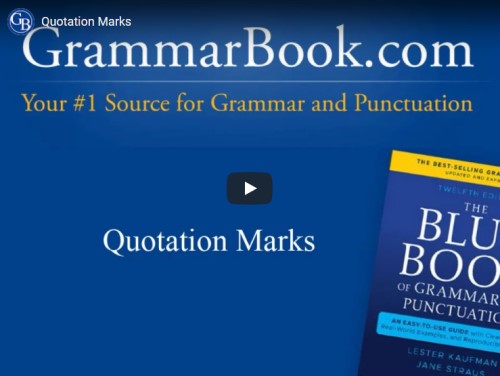|
What Are Qualifiers and Intensifiers?
|
|
The Mediterranean Chicken on the menu is really recommended.
You seem seldom energetic this week.
This hotel room is quite nice. |
When we express ourselves, we might include words meant to further limit or amplify what we aim to communicate. For example, we aren't just happy—we are very happy. After working a full day in the sun, the volunteers might say they're sort of tired.
Qualifiers and Intensifiers: Definition and Examples
Qualifiers are words we use to restrict the meanings of adverbs and adjectives. Intensifiers are words we insert to magnify them. Here are some common qualifiers and intensifiers we might write, say, or see:
| Qualifiers |
Intensifiers |
| kind of |
pretty |
| seldom |
fairly |
| sometimes |
quite |
| somewhat |
really |
| sort of |
very |
Examples
slow (adj.) > pretty slow
swiftly (adv.) > kind of swiftly
impossible (adj.) > seldom impossible |
Each qualifier or intensifier intends to enhance the meaning of the adjective or adverb being modified.
Let's look at a few qualifiers and intensifiers in complete sentences as well:
I am pretty slow to think and respond after eating a large meal.
Markus runs kind of swiftly for a man of his size.
These geometry tests are seldom impossible. |
Qualifiers and Intensifiers: Not Always Needed
Qualifiers seek to offer more information and can provide desired emphasis at times, especially in spoken conversation.
Examples
Katarina quickly reacts when challenged about her views.
Katarina seldom quickly reacts when challenged about her views. (qualifier)
Katarina very quickly reacts when challenged about her views. (intensifier) |
In writing, however, we will find that they can often be expendable. Compare the following sentence pairs.
Examples
I am pretty slow to think and respond after eating a large meal.
I am slow to think and respond after eating a large meal.
Markus runs kind of swiftly for a man of his size.
Markus runs swiftly for a man of his size. |
While the qualifying or intensifying words appear to enhance our statements, omitting them will not change our sentences by any notable degree.
Qualifiers and Intensifiers: Different From Adverbs
Because of their placement and function, words acting as qualifiers and intensifiers can resemble adverbs, but technically they are not. A standard adverb can modify a verb in addition to an adjective or another adverb; a qualifier or intensifier cannot. Regular adverbs also can be made comparative or superlative; qualifiers and intensifiers cannot be.
Qualifiers and Intensifiers: Seeking Concision
A frequent or mounting use of qualifiers and intensifiers in our writing will dilute its formality and establish an increasingly loose and wordy narrative. In many cases, we will find that we can forgo the need for a qualifier or intensifier paired with another word by choosing a better single word.
Examples
Your dress is really nice.
Your dress is elegant.
Chicago can be very cold in February.
Chicago can be frigid in February.
Eloy's input is somewhat meaningless to the matter.
Eloy's input is irrelevant to the matter.
Katarina very quickly reacts when challenged about her views.
Katarina instantly reacts when challenged about her views. |
Should content you are writing or editing seem wordy, you can help tighten it by reviewing for the adverbs and adjectives. If they have qualifiers or intensifiers, remove them if they are unneeded. If they form a two-word thought (e.g., very quickly), choose a better single word (instantly). You will reduce word count while being more concise.
Related Topics
Adjectives and Adverbs: Forms for Comparison
Composing Comparisons
|
View and comment on this
article on our website.
|
|
|

|
Pop Quiz
Identify the qualifiers and intensifiers in the following sentences. If they result in unnecessary modification, cross out the unnecessary word or provide a more-concise word to resolve wordiness.
1. Dad finds it fairly silly that you won't share your toothpaste with me.
2. It's really clear that Joe wants to play third base instead of second base.
3. The weather in Puerto is quite warm this time of year.
4. The Smiths are sort of conservative about their spending.
5. Sabrina seems pretty sure that she wants to go.
|
 |
The Blue Book of Grammar and Punctuation
by Lester Kaufman and Jane Straus |
The Authority on English Grammar! Twelfth Edition Now Available
An indispensable tool for busy professionals, teachers, students, homeschool families, editors, writers, and proofreaders.
Available in print AND as an e-Book! Over 2,000 copies are purchased every month!
To order the book, simply click the link to order the book from the GrammarBook.com website.
|
Free BONUS Quiz for You!
[[firstname]], because you are a subscriber to the newsletter, you get access to one of the Subscribers-Only Quizzes. Click here to take a Finding Nouns, Verbs, and Subjects Quiz and get your scores and explanations instantly!
We will be adding many more quizzes this year to our already substantial list of them. If you have suggestions for topics we have not yet covered, please send us a message at help@grammarbook.com.
|
Hundreds of Additional Quizzes
at Your Fingertips
Subscribe now to receive hundreds of additional English usage quizzes not found anywhere else!
Teachers and Employers
Save hours of valuable time! You may assign quizzes to your students and employees and have their scores tallied, organized, and reported to you! Let GrammarBook.com take the hassle out of teaching English!
"Fun to test my skills."
"The explanations really help ... thanks!"
"I can select the quizzes to assign to my students, and then the results are reported to me automatically!"
If you think you have found an error in a quiz, please email us at help@grammarbook.com
|
Wordplay

Pop Quiz Answers
1. Dad finds it fairly silly that you won't share your toothpaste with me. Omit fairly or use an alternative such as funny for fairly silly.
2. It's really clear that Joe wants to play third base instead of second base. Omit really or use an alternative such as obvious or evident for really clear.
3. The weather in Puerto is quite warm this time of year. Omit quite or use an alternative such as hot or tropical for quite warm.
4. The Smiths are sort of conservative about their spending. Omit sort of or use an alternative such as reserved or careful for sort of conservative.
5. Sabrina seems pretty sure that she wants to go. Omit pretty or use an alternative such as certain for pretty sure.
|
 |
English In A Snap:
68 One-Minute English Usage Videos FREE |
Learn all about who and whom, affect and effect, subjects and verbs, adjectives and adverbs, commas, semicolons, quotation marks, and much more by just sitting back and enjoying these easy-to-follow lessons. Share them with your colleagues (and boss), children, teachers, and friends as well! Click here to watch.
|
|





